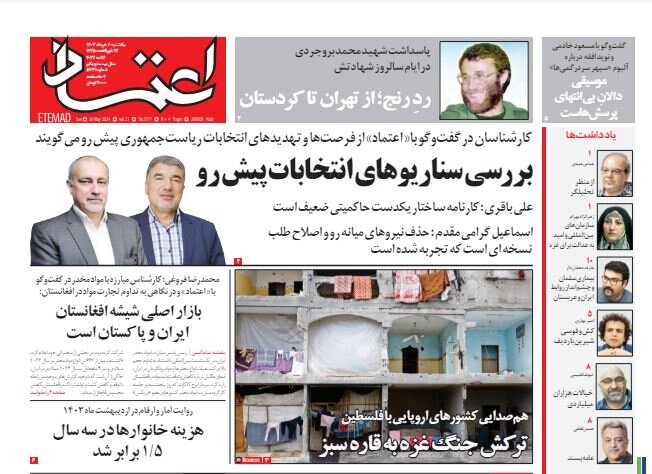TEHRAN PAPERS

TEHRAN - In an analysis, Etemad pointed out the prospect of Iran-Saudi relations and wrote: Iran and Saudi Arabia resumed their diplomatic relations in March 2023.
On the other hand, the Al-Aqsa Storm operation and the start of the Gaza war as well as the confrontation between Iran and Israel have brought the equations into a new phase, which can have important effects on the security arrangements and the future of power in the region. It should not be forgotten that the 13th government paid special attention to the neighborhood policy and Hossein Amir Abdollahian was a diplomat who was well aware of the Arab countries and played a significant role in improving Iran's relations with them in the region. However, according to Bin Salman's recent contact with Mohammad Mokhber and his expression of sympathy because of the martyrdom of Ebrahim Raisi, it does not seem that we will witness a serious change in the current relations between the two countries in the short term, and the level of relations between the two sides will have political and security aspects rather than economic aspects. Considering the process of normalization of relations between Saudi Arabia and Israel and the possibility of Trump taking office in America, there should be doubts about maintaining the same level of relations between the two countries in the future, unless a new initiative is taken by both sides to guarantee the relations between them in the long term.
Arman-e-Emrooz: America's opposition to the condemnation of Iran
In a commentary, Arman-e-Emrooz discussed America's opposition to issuing a resolution against Iran at the IAEA and wrote: America and its three main European allies do not agree on issuing a resolution against Iran, a resolution that has the potential to further intensify the tension. Western powers say that enrichment to this level cannot have any civilian purpose, but Iran says that its purposes are completely peaceful. The main reason for the American officials' opposition is that they want to prevent Iran from having a reason for intensifying its nuclear activities. Tensions in the Middle East have increased, especially with the continuation of Israel's military operations in Gaza, and this can become another crisis in the Middle East besides Gaza. The first result of the negotiations between Iran and the United States in Muscat is the opposition of the United States to Iran's condemnation. A statement against Iran will probably be issued, but Iran will not be put under more pressure until the negotiations resume in the coming weeks.
Arman-e-Melli: The golden opportunity for the Arabs to improve relations with Iran
In a note, Arman-e-Melli dealt with the welcoming of the expansion of Arab relations with Iran. The paper said: The relations between Iran and the Arab countries of the region have undergone changes and evolutions over the past years and decades. But, after taking office in the 13th government, martyr Ebrahim Raisi and his foreign minister Hossein Amir Abdollahian prioritized their neighbors in their foreign policy, and in this regard, they have visited many countries in the past three years to consolidate and expand relations. They were able to obtain good bilateral agreements with their Arab neighbors. One of the most obvious activities of this government's foreign policy in the field of relations with neighbors and Arab countries of the region, after the restoration of relations between Tehran and Riyadh, is the resumption of relations between Iran and Egypt. Now countries including the UAE, Jordan, and Bahrain have welcomed the normalization of relations with Iran and want to strengthen relations with Iran. Now we should see how much the new government that will take office in Iran will use this constructive space.
Shargh: Big decisions in foreign policy are postponed to the next government
In an interview with Rahman Ghahremanpour, a senior expert on international affairs, Shargh investigated the policies of Iran's diplomatic system in the absence of its president and foreign minister and said: The political conditions inside Iran have changed while the West Asia region and the international scene are undergoing many changes. It seems that we won't see any major decisions within the Foreign Ministry until the next election. At this sensitive regional and international time, the country is faced with the absence of two important officials, and this has made the situation more complicated, as well as cases such as negotiations to revive the JCPOA and other issues will be entrusted to the Supreme National Security Council. Our presidential elections will be held a few months before the U.S. elections, and foreign policy at this time can have a great impact on domestic developments. Therefore, due to the importance of the issue of sanctions in Iran, this election may have a small impact on the U.S. election process.

No comments:
Post a Comment